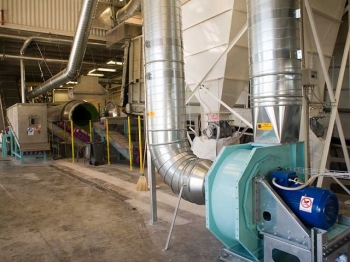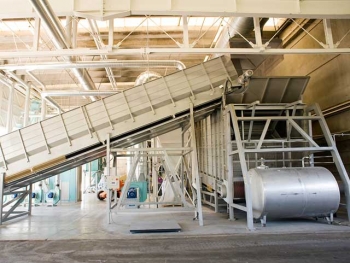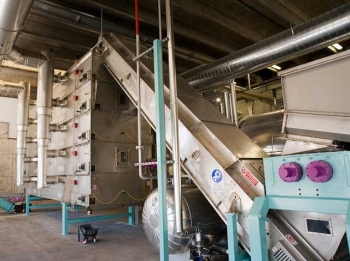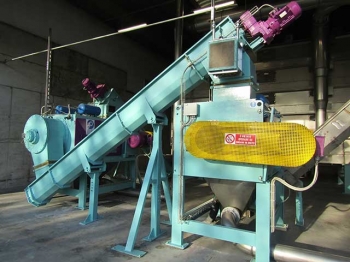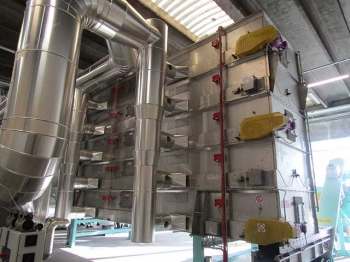
Diaper recycling technology works on an industrial scale for the first time
The technology, patented by Fater SpA, a P&G and Gruppo Angelini joint venture, can transform 10,000 tonnes per year of used diapers into new products and materials of added value; enough to serve one million people. An example of Industry contribution to Environmental Sustainability that won the company the “Circular Economy Champion” award from the European Commission.
The world’s first industrial-scale plant capable of recycling virtually 100% of used absorbent hygiene products (baby diapers for infants, sanitary napkins for incontinence and menstruation) and transforming them into secondary raw materials such as plastic, cellulose and absorbing material reached a landmark moment in Lovadina di Spresiano (Treviso) today.
Thanks to the technology developed and patented by Fater S.p.a, a joint venture set up by P&G, the maker of the world’s most popular diaper and absorbent products, and Gruppo Angelini, a leader in production and sales in Italy’s personal health care market, an entire category of products can be now recycled. This is a crucial step in offering consumers superior performing products whilst being able to introduce true circular economy solutions to this category.
The plant is unique, and the first of its kind in the world, and will demonstrate the technology’s industrial-scale efficiency, processing 10,000 tonnes of used absorbent hygiene products per year and serving around one million consumers The plant will be located at Contarina S.p.a, a company that manages waste collection in 50 municipalities in the Veneto region.
This example of how industry can create growth and leadership in environmental sustainability prompted Legambiente to award Fater S.p.A. the coveted European Commission “Circular Economy Champion” prize. It has also been awarded the EMBRACED grant from the European Commission.
These new secondary raw materials are of high quality and can be used in many new productions. One tonne of AHP waste can yield, after the separation of human waste, around 150 kg of cellulose, 75 kg of mixed plastic, and 75 kg of absorbing material that can be used in new products and processes, giving new life to used diapers.
Giovanni Teodorani Fabbri - Fater AHP Recycling BU General Manager: “The productive unit we are commissioning today is the result of technological research conducted by Fater since 2008 and its collaboration with Contarina to reach the most complete industrial efficiency. We intend to industrialize our recycling process by 2018 and will soon install another system with further innovation in Holland. Our satisfaction is twofold: knowing that we’ve done the right thing for the environment and that we’ve structured a business model that is self-sustaining in financial terms. This confirms the commitment made by Fater and its shareholders P&G and Gruppo Angelini towards the principles of Circular Economy”.
Franco Zanata – President of Contarina: “This is a big step forward in meeting the challenge we have accepted to recycle the un-recyclable: an important step in the progressive implementation of a circular economy based on practical projects and activities. This innovative system testifies to “Made in Italy” excellence in the Green sector.
Roberto Marinucci – P&G Vice President Global Baby Care, Wipes and Sustainability and Member of the Fater Executive Committee “P&G’s mission is to improve the quality of life of the consumers now and for generations to come. It is an opportunity for growth, innovation and leadership. P&G believe that diaper recycling is good for our consumers, good for the planet and good for business. It fits with our vision on zero waste to landfill. As a company committed to doing the right thing, we are taking leadership in this project.”
Jordi Ballesté – CEO of Angelini Consumer Goods and Member of the Fater Executive Committee: “We are very proud to be a part of this important project and of all the recognition Fater has received in Italy and elsewhere in Europe. This new “Made in Italy” technology is an excellent innovation, and the inauguration of this productive unit rewards our efforts and investments dedicated to the development of the circular economy, to the benefit of the environment, society, and our consumers”.
The plant inaugurated today in Lovadina di Spresiano (Treviso) is the first industrial-scale plant in the world capable of recycling 100% of used absorbent hygiene products (baby diapers, incontinence products and feminine hygiene items) thanks to the use of water vapor, which eliminates potential pathogens and malodor, thus transforming absorbent hygiene products into high-value raw materials such as plastics, cellulose and super absorbent polymer, all of which can be reused in new production processes.
A TECHNOLOGICAL INVENTION
The plant is based on an innovative technology developed and patented by Fater, which allows recycling of used absorbent hygiene products (AHP’s) of all brands, obtaining plastics, cellulose and super absorbent polymer that can be re-used as secondary raw materials, thus making a new product category recyclable and producing tangible environmental advantages.
This fully made-in-Italy technological and system innovation has received the Eco-Innovation recognition in 2011 (RECALL – ECO/II/3044409) by the European Commission.
THE PLANT EVOLUTION: FROM THE EXPERIMENTAL PHASE TO PRESENT DAY
The study and development of this technology started in 2008, first through the use of small-scale machines that, using vapor and pressure, opened and sterilized used absorbents, mechanically separating their components. Having obtained positive results from the first two increasing-volume machine models, in 2015 Fater finally produced a third experimental machine, thought out on an industrial scale. Thanks to the permit obtained from the Veneto Region and a collaboration with Contarina SpA, the machine has worked interruptedly to this day to validate the efficacy of its application on an industrial scale: the data yielded and the experience gained over three years of trial have so been used for version 4.0 of the recycling machine, whose efficiency is ready for validation on an industrial scale.
THE RECYCLING PROCESS
The diapers and other absorbent hygiene products reaching the plant after collection are directly moved to the autoclave where the recycling process begins. Here, through pressurized vapor and without combustion, they are opened and sterilized. Once the cycle has ended, the products are shredded and their recyclable components separated into plastic, cellulose and super absorbent polymer.
The new secondary raw materials are of a high quality; therefore, they can be used in new production processes: plastics can be used in all major plastic processing cycles, while cellulose can be used for different applications, including absorbent products for pets, high-quality paper, textiles and gardening applications. The super absorbent polymer can be reintroduced instead for the realization of new absorbent products and in the gardening sector.
THE ADVANTAGES
The environmental and economic advantages are well evident: first of all, the elimination of absorbent products from landfills and incinerators avoids emissions equal to those absorbed every year by over 30 thousand trees. If implemented over the entire territory of just one country like Italy, this industrial system could reduce the greenhouse gas emissions produced every year by more than 100 thousand automobiles. The recycling of this waste could spare the consumption every year of 10 hectares of land, i.e., the space occupied by 13 soccer fields or 2 Colosseums.
Equally important is the recycling of this waste into high-quality raw materials reusable in manifold new productions. In fact, up to 150 kg of cellulose, 75 kg of plastic and 75 kg of super absorbent polymer can be obtained from 1 ton of waste collected from separate disposal.
The advantages for the municipalities
Potential reduction of waste collection and disposal cost by as much as 35% in respect of the cost of waste disposal in landfills or incinerators.
The advantages for the citizens
The advantages for the citizens are manifold:
- Efficient separate waste collection service for absorbent hygiene products by way of specific bins;
- A specific separate collection of AHP’s takes away volume and weight from the total dry waste produced by individual households, on the volume/weight of which citizens pay the waste disposal tariff;
- The advantage of choosing the pads that guarantee the best performance, without environmental compromises.
THE EXPERIENCE OF FATER AND CONTARINA AT THE PLANT IN LOVADINA DI SPRESIANO (TV)
On 24 March 2015, at Contarina spa in Lovadina di Spresiano (TV), the industrial-volume efficacy experimental phase was started, which has allowed to process up to 1,500 tonnes per year, as per permit from the Veneto Region.
Following the efficiency validation phase started at Contarina spa, the plant, when fully operational, will be able to …
… process 10,000 tonnes of waste per year
… serve about one million users
… save over 13,000 cubic meters of waste in landfills
… spare over 3,000,000 Kg/year of CO2 emissions.
FATER’S STRATEGIC ROLE
Fater is an Italian company, an equal joint venture of Procter & Gamble and Gruppo Angelini. The company produces and distributes the Ace Neoblanc and Comet products in 39 Countries, in the markets of Central, Western and Eastern Europe, the Middle-East and Africa, and today it produces and markets in Italy the Pampers, LINES, LINES Specialist and Tampax products. The company is headquartered in Pescara; the Italian production plants are located in Pescara and Campochiaro (CB), while in foreign countries its plants are located in Portugal, Morocco and Turkey.
FATER’S VALUES
Quality
4% of the turnover is invested in the research and development of innovative products that Fater produces under its brand names Pampers, LINES, LINES Specialist, Tampax and ACE. The company adopts the most rigorous processes to assure quality, controlling the entire production chain from certification of suppliers, to raw materials control, production process, finished products and packaging, and sample checks at points of sale.
Sustainability
The products offer a better performance and are created to have a lower impact:
- 45% pad weight reduction over the last 20 years;
- 68% packaging reduction;
- 19% incontinence pad weight reduction;
Social responsibility
Fater has conceived a process to recycle used, separately collected diapers, incontinence products and feminine hygiene items. The plant efficacy on an industrial scale has been experimented at Contarina S.p.A. in Lovadina di Spresiano (TV). Cellulose, plastics and polymers can be separately obtained and reused in the production of many other new products.








